What Types Of Safe Are Available?
When deciding what type of safe you want, there is not a simple ‘off-the-shelf’ solution that suits every purpose. A safe that you need for your home can be very different to a safe that you need for work, for example. But there is a wide variety of choice in terms of types of safe, simply because we have very different security needs.
So a type of safe will differ according to:
- What you need to keep safe in terms of value
- What you need to keep safe in terms of size
- Whether the main risk is fire or theft, or both
- How often you need to access the safe
- Where you can store the safe
- How many people will need to access the safe
It is possible that you will need to satisfy three or four requirements in a safe design, but in the range of safes available, there is sufficient choice to find the type of safe you need. Most safe types will also have an option as to how the safe can be accessed, ie. with a key or a code that is inputted via a touchpad. So you can find the solution that is most practical for your needs. Here we will list each different type of safe and what they are most suitable for:
Different types of safe
Free-standing safes – These come in a range of sizes but predominantly give you the option of where you wish to locate them. Typically these will not be a safe that is hidden away, and will therefore be stored in a room, usually a commercial office. An important feature of this type of safe is that it will come with pre-drilled holes and fixing bolts which enable you to secure the safe to either the floor or wall. This means the safe may be visible, but it is anchored and hence can’t be picked up and removed from the premises.
Fire-proof safes – Here we have safes that have specific fire-protection, which is usually suited to commercial premises where information, data or documentation needs to be protected, rather than something with financial value. So these are items relating to product specifications, personal data, intellectual property or legal documentation, which are important to the business, rather than valuables or cash.
Wall safes – Safes of varying size which can be installed in a recess location in a wall. Typically these will be hidden from view by artwork, but can be easily accessed by those with authorisation. These types of safe will be required to have valuables security and fireproofing.
Underfloor safes – Similar to wall safes, these are a type of safe that can be hidden in a specially created recess in the floor and covered over by a rug, carpet or other floor covering. Ideally this would be a safe that doesn’t need to be accessed too often, because of the practical nature of accessing it. For more regular access to a safe that needs to be hidden, it may be more appropriate to opt for a wall safe.
Data safes – Where a business needs to store digital files of information, a data safe is ideal for this purpose. These are typically quite small because you are only storing discs, USB drives or hard drives, but the main feature is that they are ‘data proof’, which means they can withstand magnetic fields and electrostatic interference which could erase the data. In addition they will need to be fireproof.
Laptop safes – These are a type of safe specifically designed to store a laptop. So this will be a specific shape and size and will need to be fireproof and data proof.
Key safes – Where there is a need to keep a spare key available to people externally to the property, a key safe is ideal. This is a small safe specifically for storing a spare key. It can be mounted on a wall or post, and can be accessed via a unique code inputted onto a keypad. These are useful for commercial premises operating out of hours, but also for residential premises where visitors require a key, or people often leave the property without a key.
Cashbox – An organisation of any size often has a petty cash float, or needs to handle small amounts of cash. In most cases a cash box will suffice in terms of protecting this cash. This is a small, portable tin that can be locked away in a drawer and accessed very easily by authorised personnel. These are also often used by vendors at fairs, markets and events for storing a float and takings.
Portable safe – These are usually the size of a glasses case and are used for storing small, valuable items together, such as a purse, smartphone and passport, perhaps when travelling on business or when on holiday, or just on your everyday business.
Contact MB Direct
You can contact our expert sales team at MB Direct for any advice on the types of safe that we stock and what might be most suitable for your needs, so get in touch today.